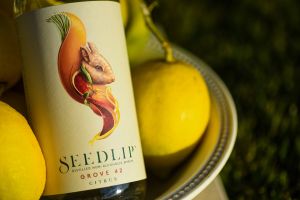 January, an often gloomy and dreary month in the UK, might not seem an obvious choice for people wanting to experience a period of sobriety. When we think about cozy gatherings, comforting dinners, and the company of loved ones we often bring up images of the shared enjoyment of a bottle. A ubiquitous image is relaxing next to a roaring fire, glass of something in hand, shutting out the wild weather outside However, after the excesses of the Christmas and New Year period, a month-long resolution in abstaining from alcohol that has gained substantial traction in recent years.
January, an often gloomy and dreary month in the UK, might not seem an obvious choice for people wanting to experience a period of sobriety. When we think about cozy gatherings, comforting dinners, and the company of loved ones we often bring up images of the shared enjoyment of a bottle. A ubiquitous image is relaxing next to a roaring fire, glass of something in hand, shutting out the wild weather outside However, after the excesses of the Christmas and New Year period, a month-long resolution in abstaining from alcohol that has gained substantial traction in recent years.
Hypnotherapy, when used as a tool for behavioural change, can significantly aid individuals in altering deeply ingrained habits like excessive or habitual drinking. By bypassing our impulses and conecting people to their greater goals and values, hypnotherapy helps people change thought patterns, potentially addressing the root causes of addiction. This can foster a more relaxed and comfortable state in social situations without the need for alcohol. Hypnotherapy empowers individuals to navigate social settings confidently while staying sober, promoting a positive shift in their relationship with alcohol.
Dry January, initially established as a formal campaign in 2013 by Alcohol Change UK, has roots stretching back to the historical context of a sober month in Finland during the 1940s. The increasing participation in Dry January underscores the growing willingness to challenge the status quo and as a society reassess our relationship with alcohol. The increasing affluence of the West has led to rising consumption across many different products that used to be considered treats, or for special occasions. Studies revealing a 70% surge in drinking between 1990 and 2017 have prompted health organizations like the World Health Organization to label alcohol as a Group 1 carcinogen, equating its risks with hazardous substances like asbestos and tobacco.
The detrimental impacts of excessive drinking on health are proven beyond doubt, contributing significantly to preventable deaths and various health complications, as highlighted by the American Center for Disease Control and Prevention. Professor David Nutt made headlines in the UK in 2010 when he suggested that alcohol was more harmful than every illicit drug. This growing concern has led experts to advocate for abstaining from alcohol as a starting point to reevaluate one’s relationship with it.
While Dry January lasts only a month, research underscores the immediate benefits for moderate to heavy drinkers, ranging from weight loss and improved diet to reductions in liver fat and blood sugar levels. Additionally, the positive effects extend beyond the month itself, with sustained changes in drinking habits observed up to six months after participating in Dry January.
Financial savings are an additional incentive, with participants reporting significant cost reductions during their abstinent period, according to surveys conducted by the University of Sussex. However, studies have presented conflicting viewpoints on the long-term efficacy of Dry January, with some indicating no substantial reduction in overall alcohol consumption for casual drinkers and others proposing the risk of compensatory drinking outside the sober month.
Recognising the limitations of a rigidly abstinent approach, a new movement has emerged, with experts advocating for a more flexible and sustainable strategy known as “Damp January.” This approach encourages individuals to moderate their alcohol intake without complete abstinence, fostering a sense of control and choice over their drinking habits. Embracing Damp January empowers individuals to make gradual changes, potentially laying the groundwork for long-term behavioural shifts.
 The benefits of cutting back on alcohol consumption, whether through complete abstinence or moderation, are multifaceted and encompass both short-term and long-term health improvements. Improved sleep quality, clearer skin, increased energy levels, reduced risk of cancer and cardiovascular diseases, lowered blood pressure, and potential weight loss are among the myriad of advantages associated with reduced alcohol consumption.
The benefits of cutting back on alcohol consumption, whether through complete abstinence or moderation, are multifaceted and encompass both short-term and long-term health improvements. Improved sleep quality, clearer skin, increased energy levels, reduced risk of cancer and cardiovascular diseases, lowered blood pressure, and potential weight loss are among the myriad of advantages associated with reduced alcohol consumption.
Adopting a moderation-based approach involves practical strategies such as reducing drinking days per week, avoiding binge drinking, maintaining a drink diary, and consciously alternating between alcoholic and non-alcoholic beverages during social outings. Additionally, reassessing social settings and exploring alternative, less alcohol-centric activities can play a pivotal role in curbing drinking habits.
Crucially, embracing a more flexible approach like Damp January allows for setbacks and acknowledges the human aspect of change. This mindset shift promotes self-compassion and resilience, encouraging individuals to view occasional lapses as opportunities for growth rather than insurmountable failures. This flexible approach marries well with hypnotherapy. Allowing people the agency to choose what is right for them, without the need for a binary or black and white worldview.
The evolving narratives around Dry January and the emergence of Damp January underscore society’s growing consciousness towards redefining our relationship with alcohol. Whether through a dedicated month of abstinence or a more flexible moderation-based approach, individuals can reap numerous health and lifestyle benefits by recalibrating their drinking habits. Hypnotherapy, in conjunction with these behavioural strategies, offers a powerful tool for navigating social situations comfortably without the crutch of alcohol, fostering lasting and positive changes in individuals striving for a healthier relationship with drinking.
If you’d like to speak to a trained, insured and supportive hypnotherapist about moderating or ceasing your alcohol intake, you can find them through the National Council for Hypnotherapy’s therapist finder.
